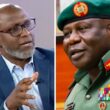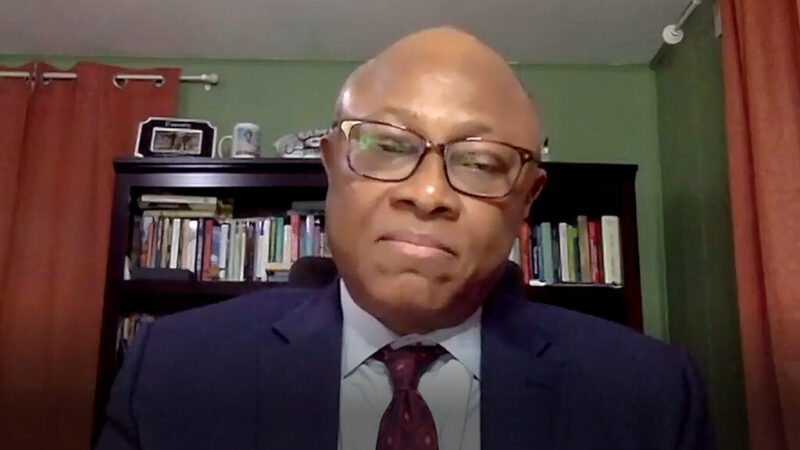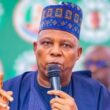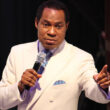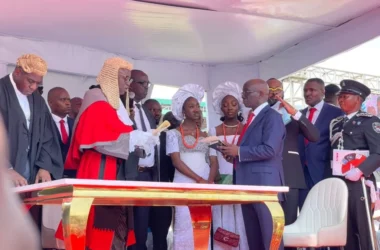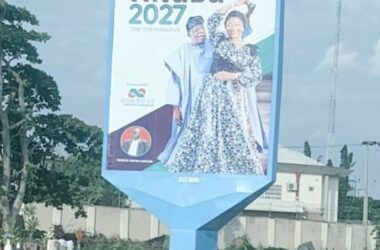As former U.S. President Donald Trump continues his campaign for a potential return to the White House, many Nigerians living in the United States are increasingly worried about the implications of his immigration policies.
Speaking on Inside Sources with Laolu Akande, Professor Nimi Wariboko, a distinguished Professor of Social Ethics at Boston University highlighted the palpable fear among Nigerians in the U.S., particularly those without proper immigration documents.
“There are a good number of Nigerians that don’t have papers. They’re worried. If you’re a pastor or a leader in that community, you’re really concerned for those people,” Wariboko noted. “Are they going to be deported? There’s that palpable fear that they could be raided more than what one has ever seen among certain groups of Nigerians.”
Wariboko explained that the fear stems from Trump’s well-documented stance on immigration, including strict deportation policies, border enforcement measures, and a proposed overhaul of birthright citizenship laws. These policies, he argued, create uncertainty not just for undocumented Nigerians but also for those who have legally obtained their U.S. citizenship.
Beyond immigration fears, Wariboko observed a growing frustration among Nigerians in the U.S. toward their fellow citizens in Nigeria. He noted that while Nigerian immigrants grapple with renewed racism, xenophobia, and the threat of deportation, some Nigerians back home appear to celebrate Trump’s policies.
“They feel like while they’re feeling the pain of Trumpism—of renewed racism, oppression, and uncertainty—Nigerians in Nigeria are celebrating Trump,” Wariboko said.
This divide is deepened by the economic contributions of the Nigerian diaspora. Nigerians in the U.S. send billions of dollars home annually in remittances, helping to sustain families and support the Nigerian economy. The potential deportation of a large number of Nigerians, Wariboko argued, could have significant financial and social consequences for the country.
Wariboko also touched on the controversial Great Replacement theory, which has fueled anti-immigration sentiments in the U.S. If mass deportations of Nigerians occur, he questioned whether Nigeria has the economic capacity to absorb and provide jobs for returnees.
“At the end of the day, if this Great Replacement theory holds, and Nigerians are deported back to Nigeria, do you have jobs to absorb them?” he asked.
Wariboko emphasized the significant economic and political ramifications of Trump’s trade policies, particularly their impact on global trade and the U.S. economy.
Wariboko noted that many Americans struggle to align with Trump’s worldview, but he acknowledged that in a democratic system, the 45th and 47th president was elected and had the authority to implement his policies. He compared the initial reaction to Trump’s policy decisions to the “shock and awe” strategy used during the U.S. invasion of Iraq, describing the widespread surprise and disbelief among Americans.
“A lot of Americans don’t see the way he [President Donald Trump] sees the world. But, it’s democracy. He’s voted into power and he’s doing it. Initially, in the first few days, people were just shocked because his policies were like the shock and awe of American invasion of Iraq. But, over time, people are now beginning to organize protests, getting on their phones to call their senators and so on. And so, gradually, some form of protests is beginning to form.”
Wariboko criticized Trump’s abrupt decision to halt all federal payments, except for Medicare, arguing that such a move was unsustainable and ultimately forced Republican leaders to intervene.
“He woke up and said he’s stopped all payments to the federal system. So, no one could get any payment. Any form of payment, he has stopped. Except for Medicare. But, that was so disruptive that governors and senators are beginning to call him. Because, even the Republican states – the Red States that voted for him, their governors and their senators and their House of Reps and political heavyweights there began to call him and he has to back down from that. You can’t just wake up and suspend the whole payment system of the Federal Government because it’s disruptive to the whole economy and to the well-being of the average American. So, people are beginning to resist that.”
He further projected that the growing public dissent could lead to significant political pushback, particularly in the mid-term elections, which could serve as a check on Trump’s administration if his party lost control of the House and Senate.
“And we can see more of that growing over time, that people will begin to push back some of these policies. Or, at worst, at least the mid-term elections will come in, and if he loses the House and the Senate, then there will be an effective blockage of his policies in the House and the Senate.”
On Trump’s tariff policies, Wariboko expressed concern over their potential economic fallout, arguing that the former president was disregarding their long-term effects on global trade.
“As we are seeing, he is not paying attention to the economic effects of the tariffs or the disruption in the global trade and payment system that would happen. One sees that as his way of disrupting the system, or he takes himself as a great negotiator. It’s very disruptive.”
Wariboko pointed to the reactions from world leaders, including the Canadian Prime Minister and the Chinese government, as evidence of the far-reaching consequences of these policies.
“We saw how the Canadian prime minister reacted to it. And we see how the Chinese are doing. And then, you ask yourself, where is he getting his economic theories from?”



